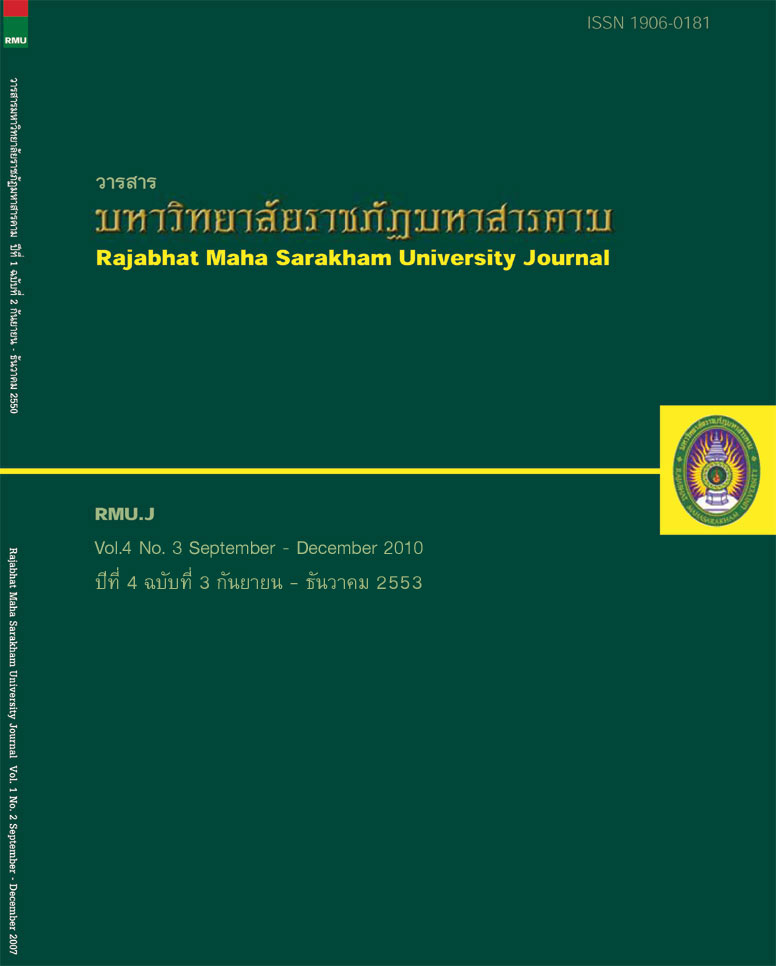ผลการเรียนรู้จากการเรียนบทเรียนบนเครือข่ายแบบเว็บเควสท์กับการเรียนปกติรายวิชานวัตกรรมและเทคโนโลยีสารสนเทศทางการศึกษาของนักศึกษระดับปริญญาตรีมหาวิทยาลัยราชภัฏมหาสารคาม
Main Article Content
บทคัดย่อ
บนเครือข่ายแบบเว็บเควสท์ กลุ่มตัวอย่างที่ใช้ในการศึกษา คือ นักศึกษาระดับปริญญาตรี สาขาวิชาคณิตศาสตร์ มหาวิทยาลัย
ราชภัฏมหาสารคาม ได้มาโดยการสุ่มแบบกลุ่ม (Cluster Random Sampling) จำนวน 2 ห้อง 78 คน ได้แก่นักศึกษากลุ่มทดลอง จำนวน 39 คน ที่เรียนบทเรียนแบบบนเครือข่ายแบบเว็บเควสท์ และนักศึกษากลุ่มควบคุม จำนวน 39 คน ที่เรียนแบบปกติ ดำเนินการทดลอง ในภาคเรียนที่ 2 ปีการศึกษา 2552 เครื่องมือที่ใช้ในการวิจัยได้แก่ 1) บทเรียนบนเครือข่ายแบบ
เว็บเควสท์ รายวิชานวัตกรรมและเทคโนโลยีสารสนเทศทางการศึกษา แผนการจัดการเรียนรู้แบบปกติ 2) แบบทดสอบ
วัดผลสัมฤทธิ์ทางการเรียน 1 ฉบับ มี 40 ข้อ มีค่าอำนาจจำแนก (B) ระหว่าง 0.21 ถึง 0.86 และมีความเชื่อมั่น 0.87
3) แบบทดสอบวัดความสามารถในการคิดวิเคราะห์ 1 ฉบับ มี 30 ข้อ มีค่าความยาก (P) ระหว่าง 0.23 ถึง 0.77 ค่าอำนาจจำแนก (r) ระหว่าง 0.23 ถึง 0.85 และค่าความเชื่อมั่น 0.88 4) แบบวัดปฏิสัมพันธ์ในการเรียน 1 ฉบับ มี 40 ข้อ มีค่าอำนาจจำแนก (rxy) ระหว่าง 0.32 ถึง 0.85 และค่าความเชื่อมั่นของแบบวัดทั้งฉบับ 0.95 และ 5) แบบวัดความพึงพอใจต่อบทเรียนบนเครือข่าย
แบบเว็บเควสท์ 1 ฉบับ มี 30 ข้อ มีค่าอำนาจจำแนก (rxy) ตั้งแต่ 0.37 ถึง 0.82 มีค่าความเชื่อมั่น 0.96 สถิติที่ใช้ในการวิเคราะห์ข้อมูลคือ ค่าร้อยละ ค่าเฉลี่ย ส่วนเบี่ยงเบนมาตรฐาน และ Hotelling T2ผลการวิจัยพบว่า
1. บทเรียนบนเครือข่ายแบบเว็บเควสท์ มีประสิทธิภาพเท่ากับ 84.60/84.68 เป็นไปตามเกณฑ์ที่คาดหวัง
ไว้คือ 80/80
2. บทเรียนบนเครือข่ายแบบเว็บเควสท์ มีค่าดัชนีประสิทธิผลมีค่าเท่ากับ 0.7350 คิดเป็นร้อยละ 73.50
3. นักศึกษาที่เรียนด้วยบทเรียนบนเครือข่ายแบบเว็บเควสท์มีผลสัมฤทธิ์ทางการเรียน สูงกว่าการเรียนแบบปกติ อย่างมีนัยสำคัญทางสถิติที่ระดับ .01
4. นักศึกษาที่เรียนด้วยบทเรียนบนเครือข่ายแบบเว็บเควสท์มีความสามารถในการคิดวิเคราะห์ สูงกว่าการเรียนแบบปกติ อย่างมีนัยสำคัญทางสถิติที่ระดับ .01 5) นักศึกษาที่เรียนด้วยบทเรียนบนเครือข่ายแบบเว็บเควสท์กับการเรียนแบบปกติ มีปฏิสัมพันธ์ในการเรียนไม่แตกต่างกัน 6) นักศึกษามีความพึงพอใจต่อการเรียนด้วยบทเรียนบนเครือข่ายแบบเว็บเควสท์อยู่ในระดับมาก
The purposes of the research were to a) develop the WebQuest-based instruction in Educational Innovation and Information Technology that meets the required 80/80 efficiency criterion, b) to determine its effectiveness index, c) to compare learning achievement of students learning through WebQuest-based instruction and those with conventional instruction, d) to compare analytical thinking abilities and learning interaction of the two groups, and e) to study learners' satisfaction with WebQuest-based instruction. Subjects were 78 undergraduate students in the Mathematics Program studying at Rajabhat Maha Sarakham University in the second semester of the academic year 2009, selected by using cluster random sampling and assigned to 2 classes of 39 each. The instruments used were the WebQuest-based instructional plans for Educational Innovation and Information technology, instructional plans for conventional instruction, a 40-item achievement test with 0.21-0.86 discrimination power (B) and 0.87 reliability, a 30-item test of analytical thinking abilities with 0.23-0.77 difficulty and 0.23-0.85 discrimination power and 0.88 reliability, a 40-item questionnaire on learning interaction with 0.32-0.85 discrimination power and 0.95 reliability, a 30-item questionnaire on learning satisfaction with 0.37-0.82 discrimination power and 0.96 reliability. The statistics used for analyzing data were percentage, mean, standard deviation and Hotelling T2.
Research results are as follows: 1) The efficiency of WebQuest-based instruction was 84.60/84.68, which was higher than the required 80/80 criterion; 2) the effectiveness index of WebQuest-based instruction was 0.7350, indicating that the students made 73.50 per cent learning progress; 3) the learning achievement of students learning through WebQuest-based instruction was higher than the achievement of those learning through conventional instruction at the .01 level of significance; 4) students of WebQuest-based instruction showed significantly higher analytical thinking abilities than those learning from conventional instruction at the .01 level; 5) students of WebQuest- based instruction and those of conventional instruction did not show any significant difference in learning interaction; and 6) the overall satisfaction of students learning through WebQuest-based instruction was found at a high level.
Article Details
1. บทความที่ลงตีพิมพ์ทุกเรื่องได้รับการตรวจทางวิชาการโดยผู้ประเมินอิสระ ผู้ทรงคุณวุฒิ (Peer Review) สาขาที่เกี่ยวข้อง อย่างน้อย 3 ท่าน ในรูปแบบ Double blind review
2. ข้อคิดเห็นใด ๆ ของบทความที่ลงตีพิมพ์ในวารสารมหาวิทยาลัยราชภัฏมหาสารคาม นี้เป็นของผู้เขียน คณะผู้จัดทำวารสารไม่จำเป็นต้องเห็นด้วย
3. กองบรรณาธิการวารสารมหาวิทยาลัยราชภัฏมหาสารคาม ไม่สงวนสิทธิ์การคัดลอกแต่ให้อ้างอิงแสดงที่มา


